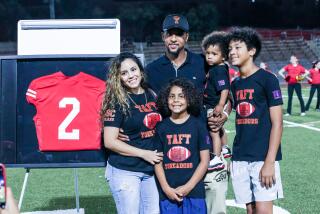L.A. COMMUNITY COLLEGE SPORTS DILEMMA : For Many, JC Athletics Opened Door to Opportunity and Achievement
- Share via
As far back as he can remember, James Butts dreamed of competing in the Olympics. For most of his life, however, the possibility of Butts’ dream being realized seemed about as likely as Lyle Alzado whipping home the winner in the Kentucky Derby.
But given a chance--perhaps his only chance--to improve both his grades and his athletic skills at East Los Angeles College, Butts changed direction. From East LA College he went on to UCLA, where he earned a degree in social science. He is now a social worker and also a part-time track coach at Pasadena City College.
And in 1976, his dream came true. He won the silver medal in the triple jump at the Montreal Olympics, the first American in 50 years to win a long-jump medal at the Games.
“When I got out of high school (Fremont High in Los Angeles), I was looking at the U.S. Marine Corps,” Watts said. “That was the only real choice I had to eventually pay for a college education. I had no financial background to do anything else. So I turned to the JC program.
“If it wasn’t for junior college athletics, I would never have made it,” Butts said. “It would have been a dream that died.”
Butts, along with Ray May and many others like him, used community colleges as a means of staying ahead while trying to realize a dream.
May credits coaches as those most instrumental in his success story. He said that at L.A. City College, football coach Jim Boyer had a rule for his players: Academics outweigh athletics.
“He constantly stressed that he wanted us to get an education more than he wanted us out on the football field,” May said. “He put his own career as a football coach secondary to our education. When someone does that, it makes a big, big impression on young kids.’
And May figures things haven’t changed much in 20 years.
“I’m sure that all over the campuses of the junior colleges today there are Coach Boyers still lighting a lot of fires . . . those who make you understand that even though you’re just a number on the football field, you’re much more than just a number off the field. I’m quite sure those guys are still around on the JC campuses.”
When May made it in the NFL, he remembered that there were a lot of kids who weren’t as lucky, kids from broken homes. People from the hard streets such as James Butts. So wherever he went, he tried to help some of them. He bought big houses in Baltimore and Denver and took in underprivileged children. He told them what was out there for them if they worked for it. He brought them to meet with doctors and attorneys and other professionals.
He showed them the possibilities.
“A lot of kids think that people just become doctors, become lawyers . . . that it just happens. I tried to show them that it doesn’t work that way, that there are steps you take to become a doctor or lawyer. And I tried to show them that they were capable of taking those steps. I tried to turn them on to the real world the same way I got turned on to the real world at L.A. City College.”
When Ray May hears of plans to chop away at athletic programs, whether on the grade school, high school, junior college or major college level, he grimaces.
“We have to do more for these kids, not less,” he said. “So many of the guys I went to high school with are passing from job to job, wandering around, lost. They never got turned on. For a lot of kids, athletics is the only real alternative to that.
“To take that away is to slam shut the only real door that these kids might pass through.”
Butts carried that statement a step further. His tone was one of anger and distrust.
“Usually it’s somebody that has no inkling about sports, never played sports, never watched sports, who say we don’t need it (community college athletics),” Butts said. “These people never competed on any organized level. If they had, they would know what sports can do for a person’s overall being. If you don’t have any background in sports, you shouldn’t say anything negative about sports.”
More to Read
Go beyond the scoreboard
Get the latest on L.A.'s teams in the daily Sports Report newsletter.
You may occasionally receive promotional content from the Los Angeles Times.






